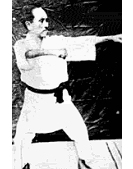|
With the splintering of the JKA and the onset and progression of ‘sports karate’, senior exponents of Shotokan discussed how they could best maintain the classical budo aspect of the art, while maintaining a credible grading structure within the eyes of the international Shotokan fraternity. Many of these instructors had been taught by senior Japanese instructors fresh from the JKA instructor’s class, many of them had trained in Japan, some in the JKA instructors’ class itself, but all of them had a pedigree which dated back to the early years of Shotokan karate in their country of origin. These individuals had been training for in excess of 30 years and more in Shotokan Karate.
It is therefore fair to say that there are more senior Shotokan instructors outside Japan than are inside, the vast majority of which are non-Japanese. With the pedigree and lineage that those senior instructors held it was felt that an Academy should be formed which like minded individuals could support. In April 2004, some senior international Shotokan yudansha decided to form the International Shotokan-ryu Karate-do Shihankai (ISKS). The ISKS was set up in order that those individuals who made up the cohort of ‘founding fellows’ and any future fellows, would mutually support, ratify, grade and make awards to other individuals in fellowship of that body. The I.S.K.S is by its structure a Shotokan Academy as well as an international certificating agency for senior Shotokan karate-ka. Its mission statement states:
The Shihankai is a non profit, apolitical academy of senior Shotokan karate-ka who will, through its technical committee, ratify/grade those individuals from Godan and above, who are accepted into fellowship. Entry into the Shihankai will only be through the recommendation of an existing fellow. The Shihankai, is therefore not an association, it will not licence nor insure, but will allow and act as a forum of ideas and training practices for the future enhancement of Shotokan-ryu as a martial art in the western world. However, its main purpose is to act as a Shotokan certificating agency which will add international credence to the national association grades fellows currently hold or may hold in the future. Certificates will therefore be issued by the Shihankai to fellows. A recommendation/ invitation however, does not automatically mean acceptance into the ISKS. By ensuring acceptance to the technical committee of the Shihankai is only by invite/recommendation from existing senior karateka in fellowship of the organisation, it is hoped that the standards of the group will be maintained and quality assured by the group itself.
The ISKS function:
The makeup of the ISKS is loosely mirrored on a postgraduate academic or professional college. It gives its membership access to gradings/ratification of grades, sho-go and by the virtue of it being an 'International Shihankai', use, if the individual fellow deems it appropriate, the title of 'Saiko-shihan' (international master). This is in line with other mainstream, international Shotokan groups. To be eligible for Fellowship the applicant must hold a Go(5th)dan grade or above from a Shotokan group or instructor acceptable to the Technical Committee of the ISKS.
At its inauguration in June 2004, the Executive Committee invited a group of known senior Shotokan karateka to join the ISKS as 'founding fellows'. The Executive Committee therefore took on the role as 'court of electors'. This was carried out in this manner to follow the protocol set by other professional/academic colleges at their inception. The invitation and acceptance of founding fellows ensured that ordinary fellows could be raised, at which point the process became self perpetuating. After the founding fellows were in place, the Technical Committee was formed in July 2004. The Technical Committee was made up from a cross section of those initial individuals and has become an 'awards/investigating committee' for the ISKS The ISKS is therefore elite by its requirements for fellowship, and only accepts applications from recommended individuals holding grades from the JKA, JKS, JSKA, WSKF, SKI, ISKF, ISKDA, SRKHI, KWF, ITKF, WTKO, WKF or WKC affiliated Shotokan groups or any other Shotokan organisation acceptable to the I.S.K.S, who may have no direct affiliation to the above.
All ISKS fellows can therefore be classed as being part of a 'Council of Fellows or a Council of International Shihan’s ('Saiko-shihan)' who, by virtue of that council's makeup, ratify grades which are held by all other ISKS fellows. This is conveyed through the issuance of ISKS Dan grade certificates and the award of sho-go by the Technical Committee. This means that every individual holding a Dan certificate from the ISKS has had their grade ratified or awarded by what is currently a reputable Shotokan ‘stable’ consisting of well known, senior international Shotokan yudansha. This follows a similar process to the Japanese system where awards were given by their peers/superiors rather than their students. The JKA is a typical example.
The Shihankai will also award, where it is deemed appropriate, the sho-go (titles) of Renshi, Kyoshi and Hanshi following the Federation of All Japan Karate-Do Organisation’s (FAJKO) directive of March, 1971. This is also currently in line with the use of sho-go by other Shotokan groups through their Senior Japanese instructors. It is our belief that, as much as we respect our roots and our seniors in the art, we should have the combined knowledge, experience and understanding to function as a distinct and autonomous Shotokan certificating agency in our own right. All grades of fellows will be taken from the date of attaining their current grade or in certain circumstances to a grade deemed appropriate by the ISKS technical board. Future grades will be ratified or awarded by the Shihankai using the 1971 FAJKO directive as necessary/required.
|